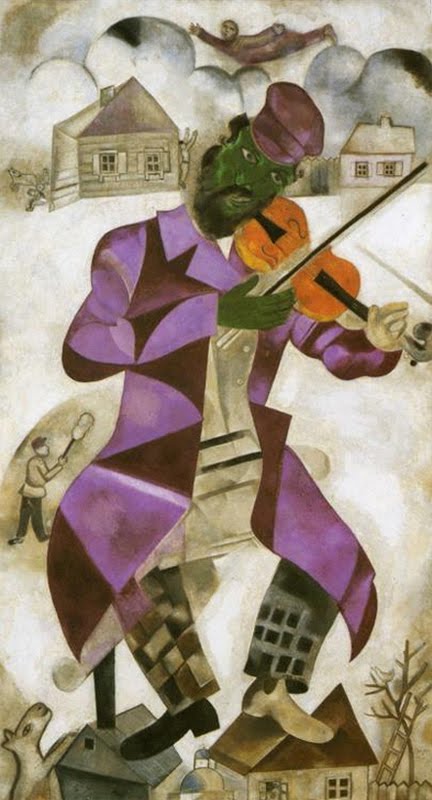Seraphic Fire transcends the centuries with music of the Jewish Diaspora

"The Green Violinist," by Marc Chagall, 1923-24.
The music of the Jewish Diaspora of ancient Iraq propelled Seraphic Fire’s presentation, titled “Out of Babylon” Wednesday night at St. Christopher’s by-the-Sea in Key Biscayne.
Cantor George Mordecai was once again a remarkable featured soloist and two dynamic musicians played indigenous ethnic instruments in a fascinating evening of Middle Eastern music that transcended its historical roots.
After the forced emigration of the Diaspora to ancient Babylon, a fusion of Judaic and Arabic musical traditions mirrored social and business relationships. Rather than more familiar Western modes, this music was based on the Eastern scale. Marked by octave leaps and quarter tones, these works were passed down through an aural tradition rather than published scores. Austere and otherworldly, these pieces fashion a unique sound world that is consistently compelling.
It was wonderful to see artistic director Patrick Dupre Quigley, who missed the group’s recent Midwestern tour due to illness, back in command. For this program, Quigley led a choir of eight male voices and played the Indian harmonium, an instrument with a small keyboard capable of unobtrusive quasi-percussive sound effects. Daphna Mor contributed instrumental support on six varieties of the ney—an Arabic flute—as well as the more traditional recorder. Rajesh Bhandari provided a one-man rhythm section with a brilliant display of Indian tabla drumming and the occasional cymbal.
At the center of this fusion of musicology and formidable contemporary performing forces stood the Australian-born Mordecai, former cantor at Miami Beach’s Temple Emanu-El. Whether spinning haunting incantation, displaying vocal acrobatics that prefigured Baroque roulades or delivering clipped, rhythmic anthems, Mordecai offered a stunning exhibition of indigenous vocal traditions. His vibratoless vocalism and natural delivery are much closer to folk singing than the modern classically oriented tenorial cantor tradition. Singing with vibrancy and soulful immediacy, Mordecai’s sterling musicianship and absorption in every bar were a model that many artists could well emulate.
Rather than attempting some variant of period performance, Mordecai and Quigley presented a thoroughly contemporary vision of an ancient culture, both reverent and creative. The male choir sang vigorously in an unforced, populist manner that was light years removed from their pristine, finely polished Baroque offerings.
Mor’s opening flute solo resounded softly with almost New Age modernity but soon morphed into swirling Middle Eastern rhythmic patterns. At times her duos with Bhandari’s throbbing tabla swayed to variations of a cool jazz beat but she excelled in spinning phrases of quiet stasis, evoking a land and sound far away and entrancingly exotic.
In the exciting El Nora, Quigley grafted a choral motet against Mordecai’s vigorous declamation – a truly modern reinvention of a rich tradition. In one of three songs of forgiveness, the male choir added to the percussive underpinning by breathing in rhythm. Other highlights included a rousing Purim anthem, the hypnotic Eastern melodic colors of Yum ha shebath and the invigorating, hand-clapping finale of El Eliyahu. With uniquely gifted guest artists, Seraphic Fire produced a deeply moving evening of music from another world that spoke in an original, remarkably contemporary voice.
Seraphic Fire repeats Out of Babylon 7:30 p.m. Thursday at Temple Judea in Coral Gables, 8 p.m. Saturday at Temple Emanu-El in Miami Beach and 4 p.m. Sunday at All Saints Episcopal Church in Ft. Lauderdale. 305-285-9060; SeraphicFire.org.
Posted in Performances
Leave a Comment
Thu Feb 10, 2011
at 7:12 am
No Comments




